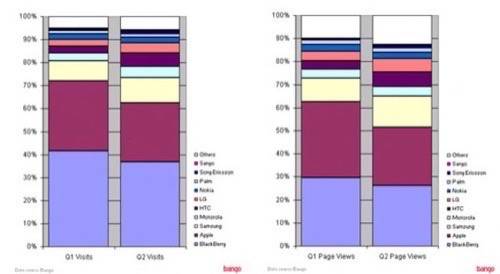The Android platform has garnered much attention lately because of its rapidly expanding number of apps and phones on the market, so additional growth statistics should come at no surprise. Mobile Web usage on Android devices in the U.S. quadrupled in the second quarter of 2010, stealing market share from Apple and BlackBerry devices, says U.K. mobile analytics firm Bango. Apple’s traffic grew just 13% causing it’s share of the mobile browsing market to fall 16%, and BlackBerry saw its similarly slow growth outpaced by Android devices.

“Apple appears to be losing ground to the latest Android handsets from HTC, Sony Ericsson, Motorola and Samsung, showing the slowest quarterly growth in Web browsing.”
– Ray Anderson, CEO Bango
Statistics like these can be misleading or confusing to some mobile consumers. To paraphrase what is happening in the mobile Web industry, all platforms – Apple, BlackBerry, Android, Nokia, etc – are all seeing growth and the market is expanding. However, Android devices saw far more growth than the others in this last quarter, snagging a larger piece of the overall pie.
As Bango CEO Ray Anderson points out, BlackBerry and Apple still dominate, together accounting for nearly two-thirds of the mobile Web market.
“Even with the advent of Apples new iAd platform and Google’s acquisition of AdMob, BlackBerry still represents the best volume opportunity for mobile advertising in the USA”, says Anderson. “Apple appears to be losing ground to the latest Android handsets from HTC, Sony Ericsson, Motorola and Samsung, showing the slowest quarterly growth in Web browsing.”

So what is the take-away from this latest set of data? It would appear that the device fragmentation of the Android market is helping the platform by continually adding to its volume of users. Developers should be encouraged by the increased traffic on Android devices, both from mobile Web and app usage, as the platform’s growth seems to be building steam.
Unfortunately for Android fans, not all of them are.
Just today, the Nieman Journalism Lab released an iPhone app while arguing against the creation of an Android app. To paraphrase lab director Joshua Benton, the organization doesn’t feel an Android version of its app is necessary because a very small amount of its traffic comes from Android devices. While it makes sense to serve its largest group of customers first, it should behoove them to release an Android app precisely because Android users are their smallest group.
As we saw last week, many more notable mobile applications are embracing the demand for Android apps. GetGlue launched an Android app in just a few weeks after its iPhone app helped traffic explode and angry Android users flooded the company’s inbox demanding an app. StumbleUpon, when making its first forays into mobile applications last week, made a smart choice by releasing iPhone and Android apps simultaneously.
Bango’s latest data is just further evidence of the expanding Android platform and the growing risk of underserving this segment of the market.

















